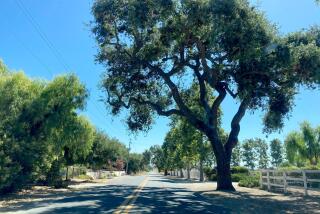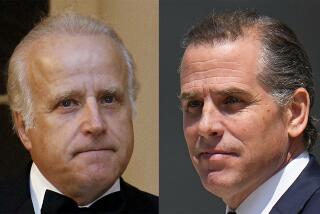President Defends Wealthy Donors’ White House Visits
- Share via
WASHINGTON — President Clinton on Wednesday defended as “entirely appropriate” his practice of inviting wealthy donors to the White House, but a key House Republican charged that new evidence of Clinton’s direct involvement justifies a “bigger and broader” investigation of White House fund-raising activities.
“I don’t think people who support you and help you through tough times and who believe in what you’re doing should be disqualified from being the president’s guest at the White House,” Clinton said during a news conference.
The president, trying to deflate the ballooning controversy over Democratic fund-raising efforts, said it was his family--not taxpayers--who bore the cost of accommodating White House visitors, “seven-eighths” of whom he had relationships with “independent of my campaign for president in ’92.”
Clinton’s defense of the Lincoln Bedroom sleepovers and White House coffees with donors and other supporters came amid growing anxiety among Democrats on Capitol Hill about the political repercussions of the fund-raising controversy and demands by some lawmakers for appointment of an independent counsel to investigate the matter.
Republicans, meanwhile, used the latest revelations to justify expanding their investigation of Democratic fund-raising efforts.
“The investigation is unfortunately getting bigger and broader. It seems to be that way every day,” said Rep. Dan Burton (R-Ind.), chairman of the Government Reform and Oversight Committee that is conducting the House inquiry.
Speaking at a news conference with sponsors of legislation that would prohibit the use of the White House for political fund-raising, Burton said the new information was particularly troubling because it showed Clinton constructing a plan for rewarding donors of large sums.
“The president in his own handwriting indicated he was not only involved but an architect” of that plan, he said.
In an effort to dispel charges that he sold access to the White House, the president has repeatedly released documents that he and his staff believe support their case. On Tuesday, the White House released 500 pages of documents, including a list of most of the 938 guests who spent the night at the White House in the last four years.
However, the documents, which include notes handwritten by Clinton, show that the president played a direct role in deciding to invite to the White House both people who had made large political contributions in the past and those who might do so in the future.
At the news conference, Clinton stressed that no money was solicited at White House coffees, although officials certainly hoped that the intimate events would inspire large contributions.
“There was to be no price tag on the events,” Clinton said. “Did the people hope that the folks that came to the events would subsequently support me? Yes, they did.”
The White House has admitted that the president and his advisors were so shaken by huge Democratic defeats in the 1994 congressional elections that they decided an aggressive strategy was needed to boost the spirits of party supporters--and to step up the flow of money into campaign coffers.
The president argued Wednesday that he did nothing wrong by inviting donors as well as friends to spend the night at the White House or attend coffees, even if there was an implicit expectation that donations would result from these visits.
“I don’t think there’s a legal issue there,” Clinton said.
But the new revelations appeared only to have increased the anxiety level among Democrats on Capitol Hill about the burgeoning controversy over fund-raising practices by their party and the White House.
Some Democrats winced at Wednesday’s front-page newspaper articles that featured photographs of the president’s handwritten instructions to invite wealthy Democratic donors to stay overnight at the White House.
“This is pretty significant,” said a Democratic senator who asked not to be named. “Wherever the lines are, they tried to figure out how close they could skate to the line.”
“Clearly it’s excessive and stinks to high heaven,” said a senior House Democrat, who also asked not to be named.
Burton, who met Wednesday with FBI Director Louis J. Freeh, said his committee had so much preliminary investigative work to do on alleged fund-raising irregularities that it may not conduct public hearings until April or May.
Some Democrats privately conceded that the new information made it more likely that an independent counsel would be appointed.
“There will certainly be more pressure for an independent counsel,” said one senator, who also spoke on condition that he not be named. “Every day you open the paper, the hole gets deeper.”
On Tuesday, Senate Majority Leader Trent Lott (R-Miss.) joined several other lawmakers--Republicans and a few Democrats--in calling for the appointment of an outside counsel to investigate questionable fund-raising practices. He said that if one was appointed, the Senate’s Governmental Affairs Committee investigation might be curbed.
But in a statement Wednesday, committee Chairman Fred Thompson (R-Tenn.) said the appointment of an independent counsel would have no legal effect on the panel’s work because it has a broader job.
“Congress has an oversight responsibility to make sure that the government is operating properly . . . whether or not anyone is prosecuted for a crime,” Thompson said.
Democratic congressional leaders Wednesday were chilly to the idea of appointing an independent counsel, saying that the matter is being adequately investigated by Atty. Gen. Janet Reno’s Justice Department.
House Minority Leader Richard A. Gephardt (D-Mo.) said Reno is “well equipped to deal with these problems. She’s been very ready to take on this investigation.”
However, Reno reiterated Wednesday that she had “not received evidence that under the law would justify the appointment of an independent counsel.”
Senate Minority Leader Tom Daschle (D-S.D.) said he does not believe that there are grounds for an independent counsel but admitted that he is troubled by some of the revelations about White House fund-raising.
“We have to be above even the perception of questionable activity with regard to fund-raising,” Daschle said.
Saying that he does not “pretend to defend” the practice, Daschle added that “if you look at all of the people who were invited to stay over the last several years, the fraction of people who were actually givers is a small part of the long list.”
Daschle also said investigators should pay more attention to evidence of actual illegal practices, such as reports that the National Republican Congressional Committee sent out a brochure soliciting donations of $15,000 and $25,000 that would “directly fund House races.” Donations that large would exceed legal limits if they went directly to House candidates.
Daschle wrote to Reno on Wednesday asking her to expand her investigation to include the reported GOP solicitation.
Many Democrats, however, said there is nothing surprising in the president’s inviting friends and supporters to the White House, saying that Republican presidents have done similar things.
“I don’t know what the big hubbub’s about,” said Sen. Tom Harkin (D-Iowa). “This has been done since Jefferson’s time.”
In a related development, the federal grand jury investigating Democratic fund-raising practices, including contributions from Asian and Asian American sources, began hearing testimony Wednesday.
The Washington Post reported in today’s editions that among the witnesses who testified before the grand jury in Washington Wednesday was Rawlein Soberano, vice president of a Virginia-based Asian American business group.
Soberano earlier told the Post that DNC fund-raiser John Huang had asked to funnel more than $250,000 to the DNC through members of the Asian American Business Roundtable, and had offered the group $45,000 in return. Soberano told the Post he rejected the offer, which Huang, through his attorney, denied making.
More to Read
Get the L.A. Times Politics newsletter
Deeply reported insights into legislation, politics and policy from Sacramento, Washington and beyond. In your inbox twice per week.
You may occasionally receive promotional content from the Los Angeles Times.











